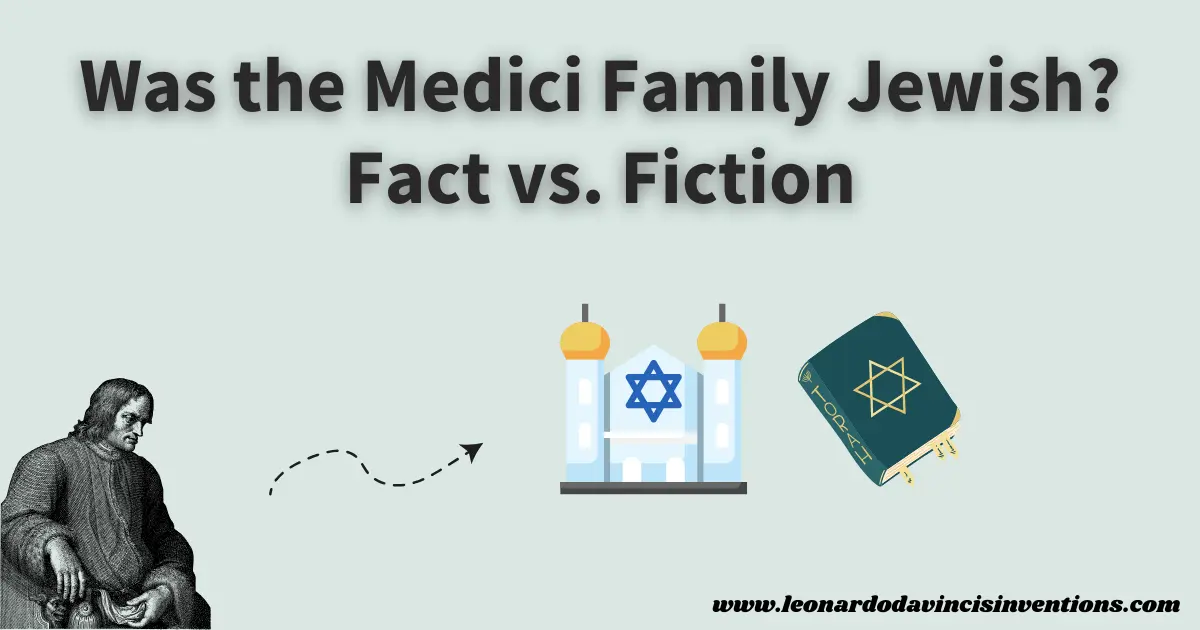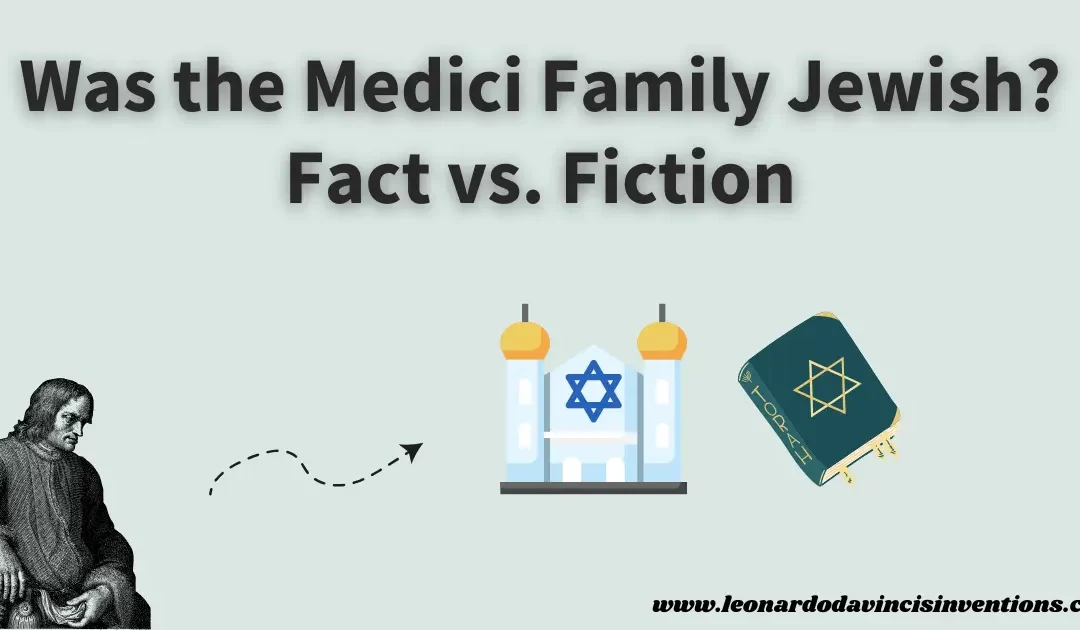
Medici family Jewish rumors have confused many people about the true history of one of Italy’s most famous families.
If you’re wondering whether the Medici family was Jewish, you’re not alone. This post will lay out the facts and explain the connections between the Medici and the Jewish communities of Renaissance Italy.
Although the Medici family was not Jewish, several historical sources note that they had strong ties with Jewish communities in Florence, Pisa, and Livorno, including connections with organized Jewish communities.
These relationships helped shape both groups’ culture and politics in the region. The Medici themselves were Christian and did not have Jewish ancestry.
Medici Family Jewish Connections: Myth, Rumor, or Reality?
The Medici family holds a key place in the history of Renaissance Florence. Their legacy is deeply tied to art, politics, religion, and commerce.
Many rumors and legends have grown around their identity, especially claims about the Medici family’s Jewish origins and direct connections to Jewish heritage.
Myths About the Medici Family, Jewish Origins, and Identity
Myths about the Medici family’s Jewish roots have persisted for centuries. Some stories claim that the Medici dynasty descended from Sephardic Jews who migrated to Italy during the medieval period.
These tales often link the family’s banking and commerce success to Jewish ancestry and merchant traditions. However, historians and genealogical records show no credible evidence that the Medici family was Jewish by birth or heritage.
These myths usually stem from the broader context of Jewish migration to Tuscany and stereotypes associating banking power or financial skill with Jews. The Medici, like many powerful Florentine families, achieved their status through local political strategies and alliances, rather than their hidden Jewish origins.
Medici Family Religious Background and Conversion Stories
The Medici family adhered to Catholicism, the predominant religion in Florence during the Renaissance. Leaders such as Cosimo de’ Medici, Lorenzo the Magnificent, and Catherine de’ Medici openly practiced Catholic rituals and often supported the Church in public and private life.
Conversion stories sometimes appear in fiction or popular media, but verified historical sources do not indicate that any member of the Medici family converted from Judaism to Christianity. Their political and social influence in Italian society largely depended on their Catholic identity.
Medici Family and Jewish Myths Debunked in History
Historical analysis and Jewish archives confirm that the Medici family was not of Jewish origin and did not have secret Jewish identities.
Scholars have highlighted that the Medici family interacted with the Jewish community in Renaissance Florence, sometimes protecting local Jews against persecution or forced sermons, as evidenced in records about Jews under Medici rule in Florence.
The family’s legacy includes actions that encouraged religious tolerance and supported Jewish merchants, even allowing some forms of Jewish commerce during general persecution.
This practical diplomacy fostered greater Jewish integration in Florence, but did not imply that the Medici dynasty had Jewish roots or an identity.
Jewish Community in Renaissance Florence and Medici Influence

The Medici family helped shape Jewish history in Florence through their policies, patronage, and attitudes toward religion. Jewish merchants, scholars, and bankers played a visible role in Florence’s economy and society during the Renaissance.
Jewish History in Florence: Ghetto, Migration, and Integration
Jewish presence in Florence grew in the 15th century as migrants arrived from Spain and Portugal. Many were Sephardic Jews who fled persecution during the Spanish Inquisition, seeking safer lives in Italy.
The Medici rulers offered a degree of protection, allowing Jewish families to settle and contribute to the local economy. In 1571, Cosimo I de’ Medici established the Jewish ghetto in Florence, which confined Jewish residents to a specific area of the city.
Living conditions varied, but Jews continued to engage in commerce, lending, and crafts. Despite restrictions, the Florentine Jewish community developed its traditions and maintained its identity within Renaissance society, often blending cultural practices from various regions across Europe and the Mediterranean.
Medici Patronage of Jews and Jewish Merchants in Florence
Medici patronage supported Jewish merchants and bankers, who were able to operate in Florence despite Christians facing restrictions on money lending.
Jewish families played a significant role in the banking and commercial growth of the Medici dynasty, facilitating international trade and local finance.
The Medici leadership valued Jewish expertise in commerce and often partnered with influential Jewish families. This relationship benefited both sides: Jewish merchants gained economic opportunities, while the Medici dynasty increased its wealth and power.
Records indicate that Jews played a significant role in Florence’s vibrant economy and successfully maintained their religious heritage despite interacting with Christian society.
Medici and Religious Tolerance: Protection, Persecution, and Society
The Medici family’s approach to religious diversity was complex. At times, Medici rulers protected Jewish residents from anti-Semitism, providing legal and economic safeguards.
Some Jewish professionals rose to important positions, including physicians at the Medici court. However, the establishment of the ghetto also marked a period of increased supervision and social separation, reflecting broader trends in Italy.
Tolerance coexisted with control, as the Medici recognized the benefits of Jewish commerce but remained influenced by Catholic pressures. Even so, the Jewish community in Florence managed to preserve its identity, history, and legacy despite changing political and religious environments.
Jewish communities of Florence, Siena, Pisa, and Livorno remain linked to the Medici era and its mixed policies toward religious minorities.
Legacy of the Medici and Jewish Relations in Italy
The Medici family played a significant role in Jewish history in Florence. Their power and wealth shaped the lives and opportunities of Jewish residents, leaving a complex legacy in Renaissance Italy.
Medici Family and Jewish Commerce: Banking, Power, and Politics
The Medici family built a financial empire and established Florence as a hub for international trade during the Renaissance. Jewish merchants and bankers played a significant role in this boom, forming extensive networks that connected Florence to other parts of Europe and the Mediterranean.
The Medici were not Jewish, but they relied on Jewish expertise for commerce and banking, especially since Jews could perform certain financial operations that Christians could not. Under Medici rule, Jewish merchants gained some protection and the ability to operate within set boundaries.
Grand Duke Cosimo I allowed Jewish banking families to settle in Tuscany, strengthening trade and diversifying Florence’s economy. However, restrictions still existed. Jews faced social barriers and could not participate fully in political life or join the Medici elite.
This collaboration helped develop Florence into an economic powerhouse, but it did not erase prejudice or create full integration.
Jewish Archives in Medici Florence: Heritage and Roots
Jewish archives in Florence reflect a long presence and rich community life under Medici rule. These archives hold records of migration, business contracts, and family histories.
Documents show that Sephardic Jews migrated to Tuscany after facing persecution elsewhere. These new arrivals joined long-established Jewish families, creating a diverse Jewish community in Renaissance Florence.
Because the Medici family needed skills in commerce and medicine, some Jews rose to positions of trust, such as court physicians. The archives include records of taxes, property, and community rules.
These materials help scholars trace Jewish roots, identity, and connections to the governance of the Medici dynasty. Lists of tax payments and contracts reveal Jews’ ongoing involvement in Florence’s economic and social life.
For those researching Jewish history in Florence, these records provide valuable insights into integration and migration patterns.
Jewish Legacy in Medici Florence and the Medici Dynasty’s Influence
Jewish legacy in Florence remains closely tied to the influence of the Medici dynasty. The family’s policy of relative tolerance encouraged Jewish merchants to settle and expand their networks.
The granting of business privileges helped some Jewish families gain stability despite broader anti-Semitism and the later creation of the Jewish ghetto in Florence. Although Jews were excluded from formal politics and many professions, this period marked a rare example of religious diversity and patronage.
The Medici’s pragmatic politics shaped the Jewish community’s chance to grow and preserve its identity. This legacy lingers in Florence through historic synagogues, archives, and family names, illustrating the strong—but limited—Medici and Jewish connections in Italy.
Frequently Asked Questions
The Medici family played a major role in Florence’s history but were not Jewish. Their connection with Jewish communities is primarily tied to their policies and support for Jewish residents, rather than their background.
What religion was the Medici family?
The Medici family practiced Roman Catholicism. Many family members held influential roles in the Catholic Church, including producing two popes.
What happened to the Jews in Florence?
Jewish people in Florence were sometimes restricted, but the Medici rulers protected them at specific historical points. The Medici established organized Jewish communities in cities such as Florence, Pisa, Siena, and Livorno, which enabled Jews to live more securely and maintain their traditions.
What was the dark side of the Medici family?
The Medici family was involved in political violence, financial corruption, and abuse of power. Through their control over Florence, they sometimes imprisoned or exiled rivals and made enemies.
What is the ancestry of the Italian Jews?
Italian Jews have a long history dating back to ancient Rome. Their community has roots dating back to Roman times, with influences from Sephardic and Ashkenazi Jews arriving later.
Over time, Italian Jews developed unique cultural traditions.
What religion did Catherine de Medici follow?
Catherine de Medici was Roman Catholic. As the queen of France, she supported the Catholic Church, even during religious conflict.
What nationality was the Medici family?
The Medici were Italian. Their roots were in the Mugello region, north of Florence.
They later settled in Florence and became one of the city’s most influential families.
Which pope was a Medici?
Two Medici became pope: Leo X (Giovanni di Lorenzo de’ Medici) and Clement VII (Giulio di Giuliano de’ Medici). Both served during the 16th century and influenced European politics and religion.
Is the Medici bloodline still alive?
The main Medici line ended with Anna Maria Ludovica de’ Medici in the 18th century. Some distant relatives may survive, but the ruling family has ceased.
Who was the religious leader from the powerful Medici family?
Pope Leo X was a member of the Medici family who became a prominent religious leader and the head of the Catholic Church. He was known for patronizing the arts and being involved in church affairs.
Why did the Medici bloodline end?
The Medici bloodline ended mainly because there were no male heirs. The last family members either died childless or had only daughters.

 Leonardo Bianchi is the founder of Leonardo da Vinci Inventions & Experiences, a travel and research guide exploring where to experience Leonardo’s art, engineering, and legacy across Italy and Paris.
Leonardo Bianchi is the founder of Leonardo da Vinci Inventions & Experiences, a travel and research guide exploring where to experience Leonardo’s art, engineering, and legacy across Italy and Paris.